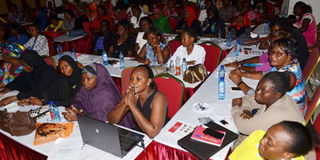Majority attribute youth radicalisation to unemployment, report says

Women at a function about countering violent extremism at PrideInn hotel in Mombasa on July 20, 2016. PHOTO | KEVIN ODIT | NATION MEDIA GROUP
What you need to know:
- The Twaweza East Africa report, Roots of Radicalisation, says that more than half of Kenyans believe that lack of job opportunities and frustration with the government and political system drive many youths to radical groups.
- The research says that about 56 per cent of respondents held the view that unemployment was a major factor in youth radicalisation, while 20 per cent of them cited poor governance.
The majority of Kenyans attribute youth’s radicalisation to unemployment and political disaffection and less about radical ideology, a report says.
The Twaweza East Africa report, Roots of Radicalisation, which was released this week, says that more than half of Kenyans believe that lack of job opportunities and frustration with the government and political system drive many youths to radical groups.
The research carried out between August 15 and September 6, 2016, says that about 56 per cent of respondents held the view that unemployment was a major factor in youth radicalisation, while 20 per cent of them cited poor governance.
“The message seems clear, excluded and discontented youth are easy pickings for terrorist recruiters,” the report says.
But this was refuted by National Police Service spokesperson Mr George Kinoti who said that there is more to the problem of radicalisation than unemployment and political disaffection.
“Unemployment has been with this country since time immemorial. We cannot therefore point youth radicalisation to unemployment. There is a root to this problem that we need to establish,” Mr Kinoti told the Nation.
He said that even Tanzania, Uganda and Ethiopia have unemployment problems but are not grappling with a lot of cases of radicalised youths as Kenya. The government has been pursuing fiery preachers believed to be at the centre of youth radicalisation.
The report, however, debunks the commonly held notion that religious motivations and religious leaders with radical views held much sway in fuelling youth radicalisation, with only seven per cent of those interviewed were of the view that the two factors were important in driving youths to the extremist groups.
TAKEN ADVANTAGE
But Mr Kinoti differs with this view, saying that some preachers have taken advantage of the vulnerability of youths to radicalise them and in the end recruit them to groups such as the al-Shabaab.
Another study by the Institute for Security Studies carried out in 2014 which looked into radicalisation in Kenya, recruitment into al-shabaab and the Mombasa Republican Council, supports Mr Kinoti’s assertions.
The research says that 34 per cent of al-Shabaab recruits indicated that they were approached by a religious figure and that the radical preachers do not have to be directly or physically present to radicalise with the respondents interviewed pointing to the effect that videos and audiotapes of the radical preachers had had on them.
But the report agrees with Twaweza research on political disaffection, saying that most respondents joined extremist groups as a counter-reaction to what they saw as government-imposed ‘collective punishment’ and also a lack of trust in the political system or the politicians.
“None of those linked to MRC and only one percent of al-Shabaab respondents indicated that they trusted politicians. Further, only 22 per cent of MRC members still believed that elections could bring about change, while only four per cent of al-Shabaab recruits had the same trust in the political process,” the study says.





